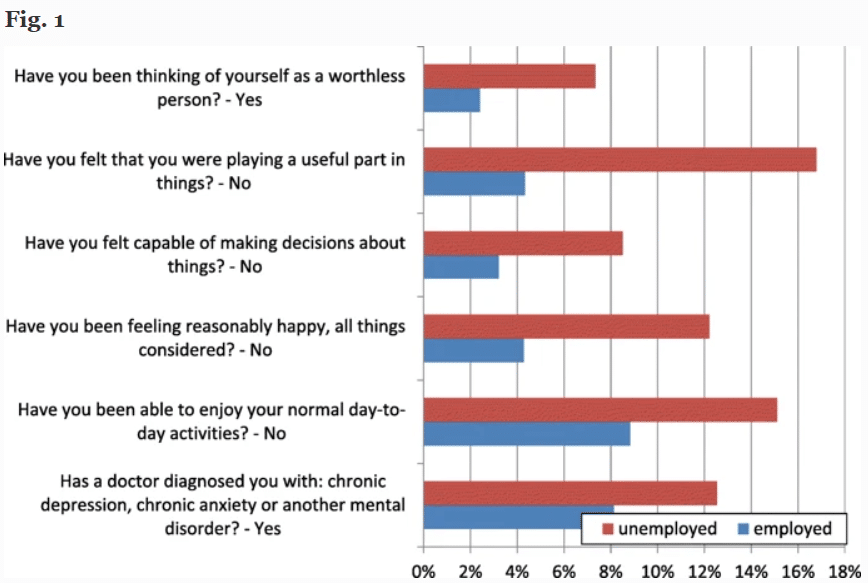Over the course of the past month, more than 17 million Americans have filed for unemployment. The U.S. Federal Reserve revealed it would be issuing roughly $2 trillion in loans to both businesses and citizens, but many have already been laid off their jobs.
Such rapid economic decline and widespread layoffs haven’t been since the Great Depression. While federal aid will help us buy essential living items for a short period of time, many U.S. citizens are going to have a hard time finding work and regaining their financial stability.
At the time of this writing, we’re currently early in the stages of a recession, and it’s impossible to predict the full economic future accurately. What we do know is that coronavirus has affected countries worldwide, and, regardless of culture, we’re all being affected psychologically — especially those who are losing income and their daily work routines.
Why is losing your job so stressful?
There have been countless studies across different periods in time and in different cultures that have nearly all linked the effects of unemployment and job loss to negative mental health consequences.
Take a look at data presented by the Spanish National Health Survey done in 2006 and 2011:

The study suggests that unemployment correlates with a mental health decline in a variety of different aspects. A significant amount of people who lost their jobs lost their sense of worth, felt useless, felt incapable of making decisions, felt unhappy, and were less able to enjoy daily activities.
With the $2 trillion in aid, those who have lost their jobs may be able to largely afford their basic physiological needs, but they most likely won’t be fulfilling their psychological and self-fulfillment needs. Let’s not forget to mention that one’s safety needs may be in jeopardy with a constant fear of possibly getting themselves or their loved ones sick.
A job is more than just how we afford to get by. It gives us a sense of purpose and meaning. And it gives our lives’ structure.
As we move past these unprecedented times and begin to look for work, most of us are going to encounter failure and rejection. We may feel out of control of our lives, feel unwanted, and have trouble with our finances. In turn, it will be natural to carry a sense of shame and experience job search depression
Job Search Depression
The consequences of losing a job have an evident negative financial impact, but the process of looking for a new one can too easily lead to mental health repercussions. It’s common to experience strong emotions like anger, anxiety, or depression.
Causes
Not much is more discouraging than applying to countless jobs and interviewing with businesses, only to be repetitively ignored or rejected.
If that becomes your experience (it often is), you may encounter a multitude of feelings:
- Absence of self-purpose or meaning
- Declined confidence and self-esteem
- Lack of belonging to a social-work community
- Loss of control and power over your own life
- Loss of professional identity and feeling unwanted
- Shame and a low desire to participate in social activities
- Uncertainty of when or if your unfavorable situation will end
How to cope
Develop a productive routine.
Stay focused on healthy and productive habits. Exercise your body and mind so you can build your self-esteem up.
You may need to reassess your skills. Be honest with yourself. Even if you are an expert, it’s always good to review foundational skills so that when the time comes, you can speak confidently.
With an open schedule, it can be hard to sit yourself down when you don’t have any clear deadlines. So, set aside a specific time to be productive, whether it’s applying to new jobs, learning new skills, relearning current skills, or producing endorphins from a good work out.
Continue networking and get people on your side.
It’s easy to get dispirited and avoid social interactions, but they’re good for you. Most people will be able to relate to your job search depression too.
Reach out to old friends from school in a similar field, talk to past coworkers, or engage with a recruiter. Recruiters are typically much more comfortable to talk to and interview with than an actual employer. They can be accommodating and giving you an honest assessment and helping boost your confidence while making the job search easier.
Whether you know it or not, there are people out there that can support you through your job search. It could be anyone.
Consider volunteering or building your portfolio.
We mentioned being productive and learning earlier, but doing relevant work can be beneficial in a few ways. With no deadlines, you can perfect a piece of work and get practice where you need it. This is a total confidence booster, and adding these pieces to your portfolio will only strengthen your future applications.
Take a break, get out, and refresh your mind.
So, you’ve established priorities, and you’re productive. But that doesn’t mean you can’t take a day off or enjoy the free time you have.
No one said the process wasn’t draining. Relax. Realize you’re doing all the right things, and it’s just a matter of time before it’s your turn for success.
Be patient. It’s difficult, but if you’re spending your time the right way, something will come your way. Trust the process.





































